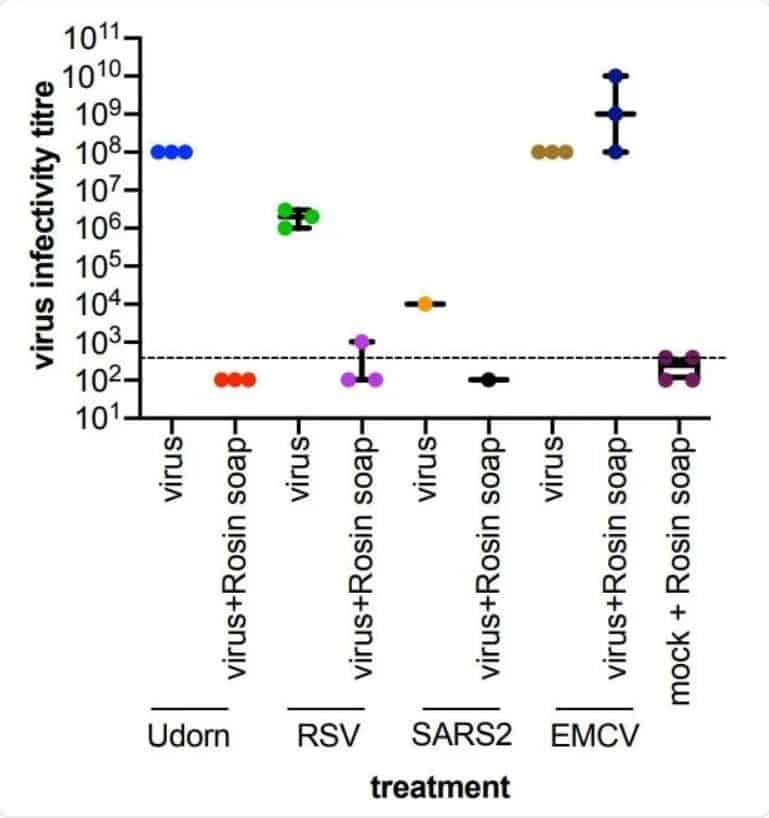Many human pathogens may remain for extended periods of time on surfaces, offering many people the possibility of direct transmission.
The SARS-CoV-2 pandemic has prompted researchers to look for safe, inexpensive, and ecologically friendly surface cleansers and personal soaps that may be used several times throughout the day.
According to a recent study, rosin soap may be one option.
- Does This Mean We Stopped Being Animal and Started Being Human Due to ‘Copy Paste’ Errors?
- The One Lifestyle Choice That Could Reduce Your Heart Disease Risk By More Than 22%
- Aging: This Is What Happens Inside Your Body Right After Exercise
- Immune-Boosting Drink that Mimics Fasting to Reduce Fat – Scientists ‘Were Surprised’ By New Findings
- Gun Violence in America: What They Don’t Talk About at the Debate
Rosin is a solid resin derived from pine trees that is used for a variety of purposes, including soap. Rosin is a lipid-soluble acid that has previously been shown to have antibacterial action against Gram-positive bacteria, working by disrupting the cell membrane.
The study, published on the preprint server bioRxiv* by Bell et al., studied the potential of rosin soap as a virucide and showed that a ten-thousand-fold decrease in infectivity against enveloped viruses such as influenza and SARS-CoV-2 in particular.
To carry out the study, the researchers infected Vero cells with influenza A, respiratory syncytial virus (RSV), SARS-CoV-2, or encephalomyocarditis virus (EMCV), Madin-Darby canine kidney (MDCK) cells with influenza A, and HEp-2 cells with RSV, then exposed them to rosin solution at concentrations ranging from 0.025 percent to 2.5 percent for 5 to 30 minutes.
The cytopathic impact of infection was also evaluated 72 hours after treatment, since the severity of infection may be extrapolated from the degree of cell rounding and death seen, particularly in influenza-sensitive cell lines like Madin-Darby Canine Kidney (MDCK).
Although the effectiveness of viral inactivation against influenza was greater, the acids in the rosin soap were shown to be cytotoxic to MDCK cells at the highest dosage tested.
To see whether rosin might be used as a surface disinfectant that wasn’t meant to be applied directly to the hands, a 2.5 percent concentration of rosin soap was exposed to the virus for five minutes before being filtered and purified and then exposed to cells. Following the purification procedure, the virus was successfully inactivated, exhibiting virtually minimal infectivity towards the cells and no residual cytotoxicity towards the cells.
EMCV is a non-enveloped model virus that is often employed in biomedical research. The infectivity of the same virus was not decreased when it was exposed to rosin soap in the same tests. At the same time, it was discovered that the soap impacted each of the encapsulated viruses in a concentration-dependent way.
The virucidal rate was unaffected by the period spent incubating with the soap. Whether exposed for five or thirty minutes, there was no variation in infectivity among the enveloped viruses. Incubation temperature with rosin showed no effect on the antiviral effectiveness of the soap, whether maintained at 370C, 200C, or 40C.

Because the soap is ineffective against non-enveloped viruses, it is thought to work by disrupting the lipid membrane, similar to how Gram-positive bacteria do. Other non-enveloped viruses, such as norovirus, may be examined to see whether there is any impact, according to the group.
The precise compound, if such a single example exists, within rosin soap that exerts membrane-disrupting activity against viruses has not been identified. However, the effect is likely one of adjusted surface tensions by surfactants.
- Does This Mean We Stopped Being Animal and Started Being Human Due to ‘Copy Paste’ Errors?
- The One Lifestyle Choice That Could Reduce Your Heart Disease Risk By More Than 22%
- Aging: This Is What Happens Inside Your Body Right After Exercise
- Immune-Boosting Drink that Mimics Fasting to Reduce Fat – Scientists ‘Were Surprised’ By New Findings
- Gun Violence in America: What They Don’t Talk About at the Debate
Image Credit: Getty
